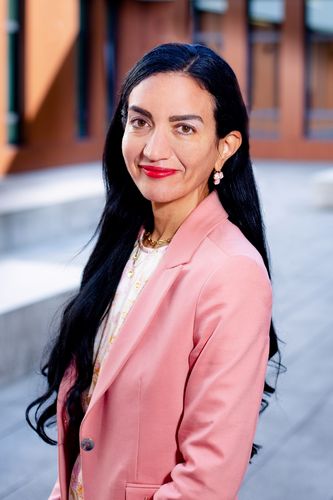How are you settling in here in Leipzig?
Pretty well, given the highly open, supportive and enthusiastic environment that awaited me here!
You explore childhood development. What do you look at exactly?
I examine the individual positive potentials of each child, how our living environments can best promote them, and how the development of these potentials affects healthy development as well as our humanity.
There are a lot of crises at the moment that are distressing to children and adolescents. How can your research tackle this and offer new perspectives?
Our research focuses on strengthening positive developmental potential and promoting positive experiences and environments for children and adolescents. It is about preparing each child to deal with the crises of our time: they need to learn how to approach them, how to grow even from crises and how to always find new meaning in life. We believe that there is a great diversity of inner resources and possibilities in both the psychological and biological realms that we have hitherto considered only to a very limited extent in our thinking and interventions. We have called this diversity of human potentials psychodiversity, and this new perspective opens up the possibility of recognising and respecting the unique strengths of each child and systematically promoting their development. This can provide innovative inspiration for the further development and transformation of the health and education system in these areas.
What goal have you set for your research in Leipzig?
Leipzig already has a great tradition of research on childhood development thanks to its excellent research environment. I would like to build on this and continue to establish and expand Leipzig as a world-leading location for research into positive childhood development, its impact on health and society, and strengthening it through innovative approaches.
You are now also the director of the Leipzig Research Center for Early Child Development. What plans do you have for the LFE and in what other ways are you involved in Leipzig’s research ecosystem?
We will further expand the excellent basic research at the LFE in an interdisciplinary manner, complementing it with applied research. The latter will take place in close cooperation with partners in research, practice, industry and the non-profit sector. I already have good connections to the local scientific community and would like to foster collaborations with the Max Planck Institute for Evolutionary Anthropology, the Max Planck Institute for Human Cognitive and Brain Sciences, SaxoChiLD and the German Centre for Child and Adolescent Health, ScaDS.AI, the Center for Scalable Data Analytics and Artificial Intelligence, and the Helmholtz Centre for Environmental Research. Research will also be conducted in close cooperation with colleagues from the Faculty of Medicine and Leipzig University Hospital, the Faculty of Life Sciences, the Faculty of Law, the Faculty of Social Sciences and Philosophy, and the Faculty of Sport Sciences. The overall aim is to establish a world-leading centre for research into childhood development, health and humanity, fostering strong national and international alliances between research and practice, and translating this into policy. This will enable us to make a sound, science-based social contribution to the positive and healthy development of every child in society.
What are your plans for teaching at Leipzig University?
I am particularly passionate about teaching, training and systematically developing talent. We intend to further link established teaching with fields of application and to teach it in a way that is accessible to students. In addition, I would like to launch targeted training programmes and initiatives to promote the potential of doctoral researchers and postdocs. Finally, I would like to contribute to the internationalisation of the teaching and training programmes by creating new opportunities for international exchange and cooperation for trainees.
Six Humboldt Professorships for Leipzig University
Leipzig University currently hosts six Humboldt Professorships. In addition to the developmental and clinical psychologist Professor Tina Malti, the University attracted the following renowned researchers in this way: the chemist Professor Jens Meiler, the philosopher Professor James Conant, the classical philologist and computer scientist Professor Gregory Ralph Crane, the physicist Professor Oskar Hallatschek, and the mathematician, statistician and computer scientist Professor Sayan Mukherjee.
Alexander von Humboldt Professorship
The Alexander von Humboldt Foundation employs a rigorous selection process to award Germany’s most prestigious international research prize. Its aim is to enable German universities to appoint world-leading researchers who are based abroad and to offer them internationally competitive conditions for pioneering research. The prize money of up to five million euros is intended to finance the first five years in Germany.






























































